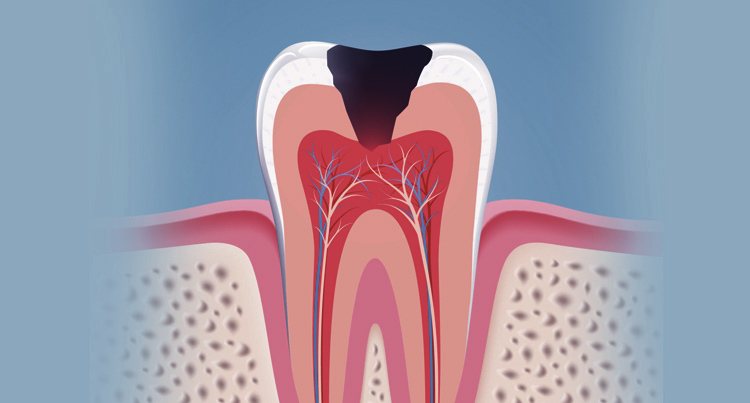Root Canal Treatment
Root canal treatment is a dental procedure that replaces a tooth’s damaged or infected pulp with a filling. The pulp is the tooth's lifeline – its vessels, tissue fibres and nerves in the central hollow of the tooth keep it alive. The procedure to repair and save the tooth involves removing the damaged pulp, cleaning and disinfecting it and then filling and sealing it. The procedure is also known as endodontic treatment.

When is Root Canal Treatment Necessary?
Usually, root canals are recommended or needed when there is an infection deep within the tooth. Root canal treatment can save a badly infected or damaged tooth. The pulp inside the tooth may have become infected or damaged because of a severe, untreated cavity or due to wear and tear, gum disease, cracked fillings or an injury to the tooth. Without treatment, the infection can become severe enough that the tooth has to be removed.
Saving your own tooth if possible is important. Your own tooth is always better than an artificial tooth for biting and chewing. Losing a tooth can lead to other problems in the mouth. Replacing a lost tooth with an artificial one often needs more complex dental procedures. Root canal treatment is often the best way of saving your tooth.
What are the signs I might need a root canal treatment?
Sometimes there are no symptoms that a tooth needs root canal therapy. More commonly, the signs include:
- severe toothache when chewing
- sensitivity to hot or cold that lasts after the heat or cold has been removed
- darkening of the tooth
- swollen and tender gums
- a persistent pimple on the gums or a hole in the toothswollen and tender gumsdarkening of the tooth
- swelling of the face or neck
How is a Root Canal Performed?
You may need more than one visit to complete the treatment, depending on the position of the tooth and the difficulty of the procedure.
Root canal treatment has four main aims:
- 1
removing active decay and infection – any old or leaky fillings, tooth decay, infected nerve tissue, pus and debris are removed
- 2
shaping the canals – in order to be filled well, the canals within the tooth root need to be shaped into smooth, hollow tunnels that are free of irregularities where residual bacteria may sit. This shaping process involves small instruments, special disinfectants and medication. It may take a few weeks to months for these solutions to take maximum effect against stubborn bacteria within the tooth, and this step may have to be repeated several times
- 3
filling the canals – to prevent bacteria from re-infecting the empty canals in your tooth, they are permanently sealed with a long-lasting barrier material
- 4
making the tooth functional again – to make sure no bacteria can leak back into the tooth, a large, well-sealed restoration is put on the tooth. Teeth that require root canal treatment have sometimes lost considerable tooth structure due to decay or cracks, and may require further protection in the form of a porcelain or gold alloy crown.
Cosmetic issues after root canal treatment
A normal tooth with a healthy pulp is yellowish-white in colour. A pulp-free tooth may eventually turn grey. The dentist can advise you on appropriate aesthetic (cosmetic dentistry) procedures.
Who can perform root canal treatments?
All dentists are trained to carry out root canal treatments. Sometimes, the dentist will refer complicated and emergency cases to an endodontist once your tooth has been assessed. Endodontists are dentists who are specialists in root canal treatment.
What are the risks and complications of a root canal treatment?
In most cases, root canal treatment is successful and the tooth will no longer cause pain. However, there is always some risk depending on the condition of the tooth, how well you keep your teeth clean, and the biting forces on the tooth.
Common risks and complications include:
- mild temporary pain due to inflammation of the tissues surrounding the tooth
- a darker tooth: there are procedures available which may lighten the tooth if this occurs
- tooth fracture: due to reduced strength and durability of the tooth: –a tooth extraction may be required –this risk is reduced when a crown is used
Uncommon risks and complications include:
- The fine metal files used to clean inside the root canals may break during use and remain in the tooth, and the tooth may need to be removed
- Depending on the size and shape of the roots, there is some risk of creating a hole in the side of a tooth root during the cleaning process
- Re- infection/ treatment failure: the tooth may require further treatment or extraction if it is unable to be saved

